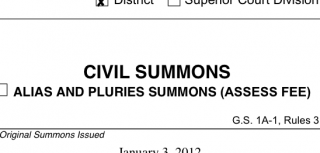Debt Collections Summons and Complaint: 5 Misconceptions
Service of a summons and complaint starts the process for the a civil lawsuit to collect debt in North Carolina, including an old credit card account, a medical debt, or a breached contract. The plaintiff might be the original creditor, an affiliated entity of the original creditor, or might even be a debt buyer that the defendant had never heard of before.
When a summons comes, it is a serious matter in which the defendant needs to quickly decide how he or she intends to proceed. Below, I list misconceptions sometimes held by newly served collections defendants:
- Misconception: I'll get more notice later.
If a defendant ignores a summons, oftentimes a lawsuit will proceed to judgment without any further notice to the defendant. The civil litigation process gives the defendant a chance to participate by responding to the summons. If you don't respond to a summons, the next thing you might receive is notice of exemption rights prior to an attempt by a creditor to seize your assets. - Misconception : I can just show up at my court date.
This is true for small claims summons, heard before a magistrate on a quick timetable. For a complaint in district or superior court, typical of many debt collection lawsuits, there is no court date unless the defendant properly responds to the complaint. - Misconception: I know I don't owe the money, so I don't need to do anything.
Unless and until the defendant speaks up by answering the complaint or otherwise responding, the court in most cases will presume the facts as set out by the plaintiff are true. It's true that the plaintiff has the burden of proof, but that burden is low in an uncontested (judgment by default) case. - Misconception: I can dispute the debt later.
If a judgment is entered in favor of the plaintiff, that is a judicial determination that the debt is owed. After that judgment has been entered, disputing the debt would require obtaining a court order to set aside the judgment--frequently a difficult task. If there is a dispute about the debt, an answer to the complaint is the way to make the dispute known. - Misconception: I owed the debt, so there's nothing I can do.
While sometimes a collections plaintiff will have every fact lined up so that the plaintiff is almost certain to win the lawsuit, there are many times where there are factual and legal problems present in a collections case. In the extreme case, the plaintiff might have violated consumer protections statutes and exposed themselves to liability in a counter-suit. Each case is different, but one should never assume there is no opportunity for a defensive strategy which may obtain a better outcome than a default judgment.
If a deadline for answering is rapidly approaching, it may be possible to obtain an extension of time. Nevertheless, a debt collection defendant is often best served by promptly seeking an attorney consultation to learn about his or her options.
After the deadline for responding to a complaint passes, a defendant's opportunities for participating and disputing the lawsuit progressively diminish as time passes, as a default will be entered by the court and then default judgment will be granted.




